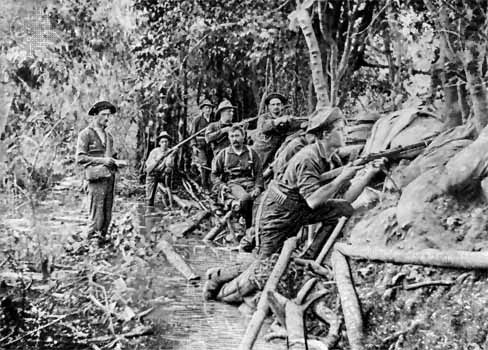Spanish-American War
Spain-United States
 (1898), conflict between the United States and Spain that ended Spanish colonial rule in the Americas and resulted in U.S. acquisition of territories in the western Pacific and Latin America.
(1898), conflict between the United States and Spain that ended Spanish colonial rule in the Americas and resulted in U.S. acquisition of territories in the western Pacific and Latin America.The war originated in the Cuban struggle for independence from Spain, which began in February 1895. Spain's brutally repressive measures to halt the rebellion were graphically portrayed for the U.S. public by several sensational newspapers, and American sympathy for the rebels rose. The growing popular demand for U.S. intervention became an insistent chorus after the unexplained sinking in Havana harbour of the battleship USS Maine (Feb. 15, 1898; see Maine, destruction of the), which had been sent to protect U.S. citizens and property after anti-Spanish rioting in Havana. Spain announced an armistice on April 9 and speeded up its new program to grant Cuba limited powers of self-government, but the U.S. Congress soon afterward issued resolutions that declared Cuba's right to independence, demanded the withdrawal of Spain's armed forces from the island, and authorized the President's use of force to secure that withdrawal while renouncing any U.S. design for annexing Cuba.
 Spain declared war on the United States on April 24, followed by a U.S. declaration of war on the 25th, which was made retroactive to April 21. The ensuing war was pathetically one-sided, since Spain had readied neither its army nor its navy for a distant war with the formidable power of the United States. Commo. George Dewey (Dewey, George) led a U.S. naval squadron into Manila Bay in the Philippines on May 1, 1898, and destroyed the anchored Spanish fleet in a leisurely morning engagement that cost only seven American seamen wounded. Manila itself was occupied by U.S. troops by August.
Spain declared war on the United States on April 24, followed by a U.S. declaration of war on the 25th, which was made retroactive to April 21. The ensuing war was pathetically one-sided, since Spain had readied neither its army nor its navy for a distant war with the formidable power of the United States. Commo. George Dewey (Dewey, George) led a U.S. naval squadron into Manila Bay in the Philippines on May 1, 1898, and destroyed the anchored Spanish fleet in a leisurely morning engagement that cost only seven American seamen wounded. Manila itself was occupied by U.S. troops by August.The elusive Spanish Caribbean fleet under Adm. Pascual Cervera (Cervera y Topete, Pascual) was located in Santiago harbour in Cuba by U.S. reconnaissance. An army of regular troops and volunteers under Gen. William Shafter (and including Theodore Roosevelt and his 1st Volunteer Cavalry, the “Rough Riders”) landed on the coast east of Santiago and slowly advanced on the city in an effort to force Cervera's fleet out of the harbour. Cervera led his squadron out of Santiago on July 3 and tried to escape westward along the coast. In the ensuing battle all of his ships came under heavy fire from U.S. guns and were beached in a burning or sinking condition. Santiago surrendered to Shafter on July 17, thus effectively ending the war.
By the Treaty of Paris (Paris, Treaty of) (signed Dec. 10, 1898), Spain renounced all claim to Cuba, ceded Guam and Puerto Rico to the United States, and transferred sovereignty over the Philippines to the United States for $20,000,000. The Spanish-American War was an important turning point in the history of both antagonists. Spain's defeat decisively turned the nation's attention away from its overseas colonial adventures and inward upon its domestic needs, a process that led to both a cultural and a literary renaissance and two decades of much-needed economic development in Spain. The victorious United States, on the other hand, emerged from the war a world power with far-flung overseas possessions and a new stake in international politics that would soon lead it to play a determining role in the affairs of Europe.
- combustion
- Comcast
- Comden, Betty; and Green, Adolph
- Comecon
- comedia
- comedy
- Comedy of Errors, The
- comedy of humours
- comedy of intrigue
- comedy of manners
- Comenius, John Amos
- Comeragh Mountains
- Comercio, El
- comet
- Comet Arend-Roland
- Comet Hale-Bopp
- Comet Hyakutake
- Comet Ikeya-Seki
- Comet Morehouse
- Comet Schwassmann-Wachmann 1
- Comet Shoemaker-Levy 9
- Comfort, Alex
- comfrey
- Comici Confidènti
- comic opera